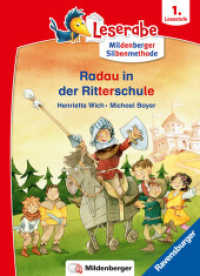- ホーム
- > 洋書
- > ドイツ書
- > Mathematics, Sciences & Technology
- > Earth Science
Full Description
The book offers a framework for working on the FEW-nexus in a design-led context and integrates the design of urban neighbourhoods and regions with methodologies how to simultaneously engaging residents and stakeholders and evaluating the propositions in a FEW-print, measuring the environmental impact of the different designs.





